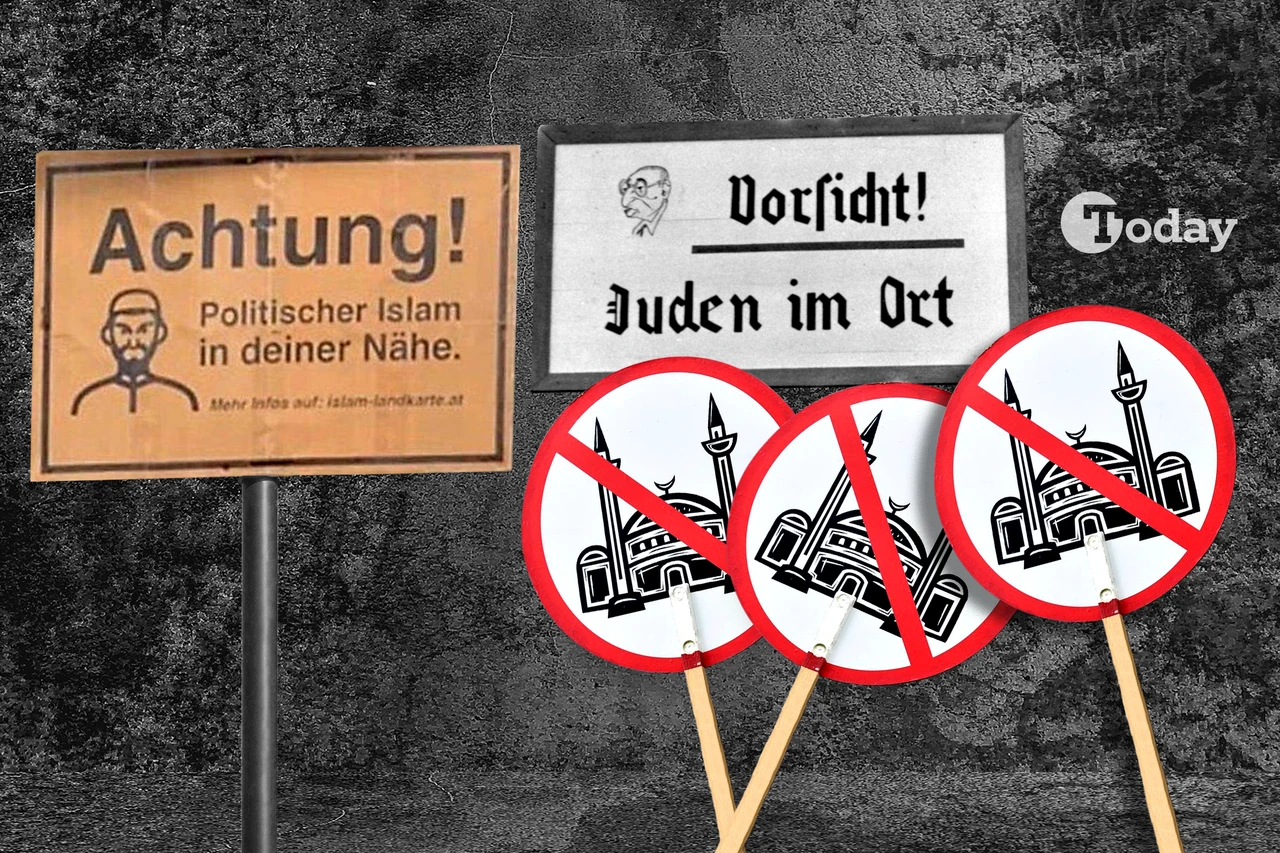Islamophobia replaces antisemitism in Europe’s far-right
 Two signs from Austria and Germany can be seen, one (R) reading "Attention! Jew!" and other "Attention! Political Islam!" (Collage Türkiye Today team)
Two signs from Austria and Germany can be seen, one (R) reading "Attention! Jew!" and other "Attention! Political Islam!" (Collage Türkiye Today team)
In recent years, the European far-right has undergone a strategic rhetorical transformation, replacing traditional antisemitism with a growing wave of Islamophobia. While the targets have shifted, the underlying frameworks of exclusion, fear and alienation remain remarkably similar.
Scholars such as Matti Bunzl and Enzo Traverso have highlighted how these two forms of bias are interconnected, with Islamophobia today functioning as a surrogate for antisemitism. This shift not only reflects political expediency but also reveals the persistence of cultural prejudices in shaping European identities. It also poses great dangers to European politics itself in terms of radicalism and ideological polarization, apart from protecting its minorities.
From Antisemitism to Islamophobia
Historically, antisemitism was deeply tied to the formation of European nation-states, with Jews often cast as the “other” to solidify national identities. The sitting director of the Wien Museum, Bunzl, handled the topic some decades before. He explained that this phenomenon was rooted in the 19th-century nation-building process, where Jews were portrayed as outsiders who threatened societal cohesion.
Italian professor of European intellectual history Enzo Traverso commented further on this analysis, arguing that antisemitism served as a “cultural code” to define who belonged and who did not, particularly in periods of rapid modernization.
In contrast, today’s Islamophobia is tied to a supranational narrative, framing Muslims as a threat to the European Union’s cultural and political fabric. Far-right parties leverage the rhetoric of “cultural conflict” to claim that Muslim immigrants are incompatible with “Western values.”
This shift allows far-right movements to present themselves as defenders of liberal democracy, forming alliances under the guise of protecting European identity. For instance, the idea of a “grand replacement,” a conspiracy theory alleging that Muslim immigrants are systematically replacing European populations, has become central to Islamophobic discourse.

Media, social media
The media has long been a powerful tool for spreading prejudice, and today’s Islamophobia thrives in the digital age. Platforms like X, formerly Twitter, serve as incubators for disinformation and hate speech. Verified accounts routinely spread false narratives, memes, and caricatures that portray Muslim immigrants as threats.
A stark example occurred in Toledo, Spain, when an 11-year-old boy was fatally stabbed in August 2024. Despite official clarification that the perpetrator was a 20-year-old Spaniard, social media posts falsely blame a Muslim immigrant of North African descent, fueling Islamophobic rhetoric.
These campaigns are not isolated. Similar disinformation played a role in violent riots in Southport, U.K., where false claims linked a stabbing incident to a Muslim migrant. The riots led to mosque attacks and heightened tensions. High-profile figures, including Elon Musk, contributed to the hysteria by amplifying Islamophobic content to millions of followers, reinforcing the narrative that diversity poses an existential threat to European society.
With their so-called “digital diplomacy” initiatives, some countries also use this gap as a political weapon. This pattern mirrors historical antisemitism, where fabricated texts like the “Protocols of the Elders of Zion” fueled conspiracy theories about Jewish control.
Today’s equivalents, such as the “grand replacement” theory, perpetuate the idea that Muslims are orchestrating cultural and demographic changes in Europe.
Rhetoric of alienation
Both antisemitism and Islamophobia rely on the rhetoric of alienation to paint their targets as outsiders. In the past, Jews were depicted as unassimilable foreigners who undermined societal harmony.
This narrative now applies to Muslims, who are accused of resisting integration and forming “ghettos” that isolate them from mainstream society. For example, Muslim neighborhoods are often described as no-go zones, echoing the antisemitic trope of Jewish quarters as centers of subversion.
Traverso notes that cultural prejudice has replaced biological racism, but the function remains the same: to define European identity negatively by contrasting it with a perceived “other.”
The democracy and institutions of Europe may not be sufficient to prevent it. Dan Slater, a professor at Michigan University specializing in emerging democracies, underscored the risks associated with such politics.
Speaking to Türkiye Today, he remarked, “Democracy can really fuel it when you have politicians who are willing to go there—who are willing to try to mobilize the majority, the ethnic or religious majority, on some kind of cultural grievance against minorities. It’s an incredibly dangerous form of politics.”
The observation resonates with Europe’s historical struggles, where crises of identity during political and economic turbulence have led to the scapegoating of minorities. The parallels between past antisemitism and contemporary Islamophobia demonstrate how dangerous this approach can be, both for minority groups and for societal stability.
Fear campaigns
Antisemitic allegations that Jews were responsible for moral and cultural decline have found a new life in Islamophobic narratives. Terms like “subculture” are weaponized to frame Muslims as a threat to European values.
Thomas Haldenwang, head of Germany’s domestic intelligence agency, the Office for the Protection of the Constitution (BfV), has warned about the dangers posed by the extremist conspiracy theories promoted by far-right parties like AfD, emphasizing the need to address this threat.
Unfortunately, however, the installation of fear is not endemic but sometimes rather reinforced by policies and statements from governments, such as Germany’s controversial state-sponsored video that portrays Islam as incompatible with modernity.
These campaigns, rooted in fear, deepen societal divisions and marginalize Muslim communities.
Journalist CJ Werleman, widely recognized for his reporting on Islamophobia, shared his analysis with Türkiye Today: “Muslims have become the perfect scapegoat for every economic and social ill. They are falsely accused of draining government budgets, creating epidemic crime waves, carrying disease, and degrading white European society.”
Consequences
Australian analyst Werleman noted, “These falsehoods and anti-Islam conspiracies have laid the groundwork for new legislation that discriminates against Muslims—ranging from bans on Islamic clothing and the closure of Islamic schools to illegal surveillance programs profiling Arabs and Africans, and monitoring mosques.”
The consequences of this rhetorical shift, however, are beyond the Muslim communities of Europe. Islamophobia exacerbates polarization, feeds political extremism, can be directed at Jews or any other minority group at any time, and alienates everybody who does not agree. The parallels to antisemitism are a sobering reminder of the dangers of unchecked prejudice. Bunzl warns that this form of “othering” destabilizes societal cohesion.
Traverso emphasizes that cultural prejudice serves as a tool for defining national identity. In times of political turbulence, attempting to solve the identity crisis with scapegoating has never led to positive outcomes, often deepening societal fractures.
Europe, with its historical experience of such missteps, is now drawing global attention for seemingly repeating these patterns, raising concerns about the consequences for both itself and the wider world. One reason that those traditional mistakes can no longer persist in their original form is that their nature as errors are now widely recognized. Simply altering their appearance should fool no one.
History warns
The European far-right’s shift from antisemitism to Islamophobia highlights how prejudice adapts to new contexts while maintaining its core function: to divide societies and marginalize vulnerable groups.
The use of cultural rhetoric, disinformation and fear campaigns underscores the enduring power of hate to shape political discourse. As history warns, failure to challenge these narratives risks not only deepening societal fractures but also repeating the tragic mistakes of the past.



